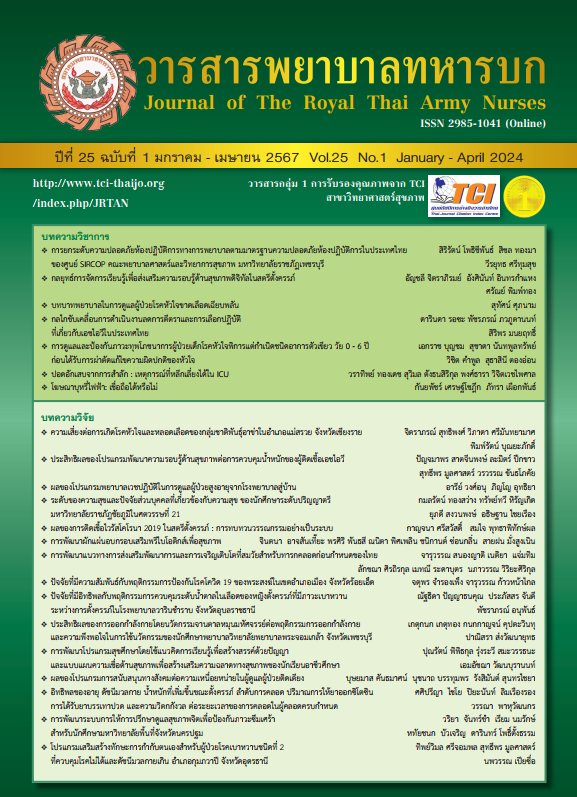The Effects of Social Support Program on Burnout in Caregivers of Bedridden Patients
Keywords:
Burnout, Social support program, Caregivers of Bedridden PatientsAbstract
The quasi-experimental research aimed at studying the effects of a social support program on the effects of social support program on burn out in caregivers of bedridden patients. The sample group was 60 caregivers of bedridden patients divided to 2 groups ; 30 people in the experimental group and 30 people in the control group. The research instruments were valid by 3 experts and a Cronbach’s alpha coefficient of .87. Demographic data was analyzed using descriptive statistics. Major findings were as follows: 1.The Maslach Burnout Inventory burnout in caregivers of bedridden patients in the experimental group had difference from post-test mean scores (M = 42.47, SD = 12.23) before attending the experimental (M = 63.60, SD = 12.09) (t = 17.23, p<.001) 2. The mean scores difference between the experimental group which attended the social support program had difference from the control group which receiving routine care ( = 21.13, SD = 6.72) between pre and post receiving social support program ( = 1.93, SD = 3.78) (t = -16.39, p<.000);
The research indicated that the social support program is effectiveness reducing burn out in caregivers of bedridden patients. Thus, the social support program is one of the alternatives for health personnel to recommend caregivers of bedridden patients or other chronic patients in order to alleviate burn out syndrome and find the way to solve problems.
Downloads
References
Nakkul N., The Development of a Care Model for Home-bound and Bed-bound Chronically ill Patients in Suratthani Municipality. Nursing Journal of the Ministry of Public Health. 2018; 23(2): 36-50. (in Thai).
Department of Empowerment of Persons with disabilities. Disability Information in Thailand. Ministry of Social development and Human Society. 2021. (in Thai).
Boonvas K., Supanun t T., Chunhabordeeand A., Wae N., Caregiver Stress and Needs in Caring Disabled. The Southern College Network Journal of Nursing and Public Health. 2017; 4(1): 205-16. (in Thai).
National Health Security Office. Research plan for developing life quality of elderly People. Bangkok. National Health Security Office. 2015. (in Thai).
Bevans M F Sternberg E M. Caregiving burden, stress, and health effects among family caregivers of adult cancer patients. The Journal of the American Medical Association. 2012; 307(4): 398-403.
Rosenfarb I S., Bellack A S., & Aziz N A sociocultural stress, appraisal and coping model of subjective burden and family attitudes toward patients with schizophrenia. Journal of Abnormal Psychology. 2006; 115(1): 157-65.
Brazil K, Bedard M, Willison K. Bereavement adjustment and support among caregivers. Journal of Mental Health and Aging. 2003; (9): 193-204.
Sritawan K, Selected Factors Related to Burnout in Caregivers of Persons With Schizophrenia In Community. [dissertation]. Bangkok: Chulalongkorn University, 2016. (in Thai)
Sritawan K, Upasen R. Selected Factors Related to Burnout In Caregivers of Persons With Schizophrenia in Community. Journal of The Royal Thai Army Nurses. 2017; 18: 308-14. (in Thai)
House J S. Work stress and social support. California: Addison-Wesley; 1981.
Chantarasin A. Social Support of Caregiving Patients With Stroke A Case Study of Nakonnayok Hospital. [dissertation]. Bangkok: Thammasat University; 2017. (in Thai)
Luvira V. Health Care for Caregivers of Patients with Terminal Illness. Srinagarind Medical Journal. 2013; 28(2): 266-70. (in Thai)
Sansamak R Sasat S. The Effect of Public Mind Social Support Program on Loneliness in Older Persons Resided in Public Welfare Home for The Aged. Journal of The Royal Thai Army Nurses. 2017; 18: 251-60. (in Thai)
Grove S K., Burns, N., & Gray, J. R. The practice of nursing research: Appraisal, synthesis, and generation of evidence (7th ed). St. Louis, MO: Elsevier Saunders; 2013.
Maslach C. & Jackson S E. The Measurement of Experienced Burnout. Journal of Organization Behavior. 1981; 2: 99-113.
Srisatidnarakul B. The methodolody in nursing research (5th edition). Bangkok: U & I INTER MEDIA CO., LTD. 2010. (in Thai).
Hanzawa S., Bae J K., Tanaka I., Bae Y J., Tanaka G., Inadomi H. et al. Caregiver burden and coping strategies for patients with schizophrenia: Comparison between Japan and Korea. Psychiatry and Clinical Neurosciences. 2010; 64(4): 377 - 86.
Sinthusopa W. The Effect of Group Social Support Program on Quality of Life in Persons with Schizophrenia’s Caregivers. [dissertation] Chulalongkorn University; 2017. (in Thai)
Chanta M., Sumattana G., Howharn. C. A Participatory Model of Behavioral Health Promotion for People with Physical Disabilities in Nuangbuor Sub – District, Srikhoraphum District, Surin Province. Primary Health Care Division Journal. 2011; 7(1): 48-56. (in Thai).
Wongupparaj R., Wonguppara P. A Comparative Study of Social and Emotional Leaning of Undergraduates Between Public and Private Universyties. Journal of Humanities and Social Sciences Thonburi University. 2012; 6(12): 7-24. (in Thai).
Jaijina O. The Influence of Personal Factors and Social Support on Job Burnout of Mental Health and Psychiatry Personnrlin Health Service Network 3. [dissertation]. Bangkok: Srinakharinwirot University. 2013. (in Thai).
Tanataveesaku A. Quality of Life and Social Support Need of Caregivers of End-Stage Cancer Patients. [dissertation]. Bangkok: Thammasat University; 2013. (in Thai).
Fumaneeshoat O. Home Visit and Palliative Care. Songklanagarind Medical Journal. 2017; 35(4): 399-406. (in Thai).
Maslach C., & Jackson S E. Maslach Burnout Inventory. 2nd ed. New York : Consulting Psychologists; 1986.
Downloads
Published
How to Cite
Issue
Section
License
Copyright (c) 2024 Journal of The Royal Thai Army Nurses

This work is licensed under a Creative Commons Attribution-NonCommercial-NoDerivatives 4.0 International License.
บทความหรือข้อคิดเห็นใดใดที่ปรากฏในวารสารพยาบาลทหารบกเป็นวรรณกรรมของผู้เขียน ซึ่งบรรณาธิการหรือสมาคมพยาบาลทหารบก ไม่จำเป็นต้องเห็นด้วย
บทความที่ได้รับการตีพิมพ์เป็นลิขสิทธิ์ของวารสารพยาบาลทหารบก
The ideas and opinions expressed in the Journal of The Royal Thai Army Nurses are those of the authors and not necessarily those
of the editor or Royal Thai Army Nurses Association.






